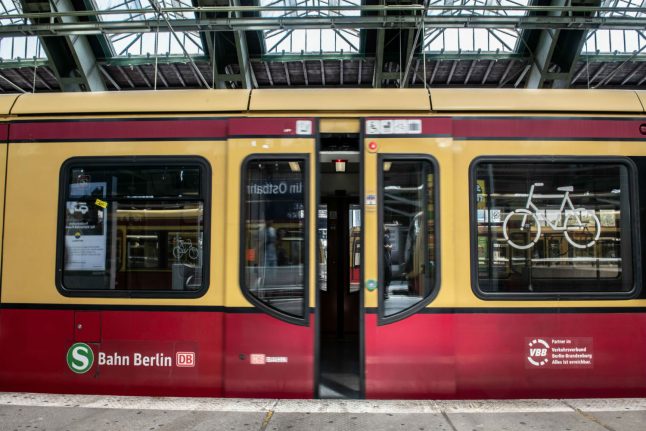Following a red-eye flight from New York, American Ludmila L. boarded a Berlin S-Bahn at Schönefeld Airport carrying all of her possessions in three suitcases and a backpack .
After several years of saving up, the freelance writer and artist was eager to make it to her new flat.
But once aboard the train, she was stopped by a ticket collector, who informed her that she needed to stamp the train ticket she had purchased.
Jetlagged after hours of travel, she had forgotten that tickets needed to be validated – especially with the lack of signs or information around.
The collector told her to follow him at the next stop.
Given his initial friendliness, Ludmila assumed he was leading her to the machine outside the train to put a stamp on her ticket. So she stepped off, asking another woman on board to momentarily keep an eye on her belongings.
“I thought he must be trying to help me. It was clear that I had just arrived at the airport,” she told The Local.
Yet the controller wouldn’t let her back on board where she had left all of her luggage, and instead explained that she would be getting a ticket. Realizing what was happening, she said she needed to get back to her bags.
The woman Ludmila had just met shouted, “Wait, her bags!”. And then the doors closed.
“My entire life was on that train,” said Ludmila, who only held on to her passport. “I was left standing on the platform as the train went zooming towards the city.”

Ludmila standing in Berlin a week after the incident in late September. Photo: Rachel Stern
‘A certain sentiment against foreigners’
Ludmila's story follows several complaints from around Germany made by newly arrived foreigners about ticket controllers.
Reports include incidents of harassment – such as an inspector in Munich who snatched a passport from a tourist when she unknowingly failed to validate her ticket – and refused to give it back.
READ ALSO: ‘German ticket collectors say I was a tourist and milked me’
The ticket collector said he would call someone to report Ludmila's luggage left behind on the S-Bahn, but when she asked “Who will you call?” he didn't say and instead brought her back to Schönefeld, she claims.
“‘Go to DB and tell them you lost your bags,’” the collector said.
“But I told him, 'I did not lose my bags, you forcibly separated me from my bags and wouldn’t let me back on the train.”
The controller and his colleague would not give Ludmila their name or ID numbers, despite her asking several times. “It felt like a certain sentiment against foreigners,” she said. “They were so rude and almost making fun of me.”
For passengers who are found “at a checkpoint without a valid ticket, this is in most cases an unpleasant situation, which also causes some of the affected passengers to complain,” Kerrin Dartsch, a spokesperson for Deutsche Bahn in Berlin and Brandenburg, told The Local.
“It is unfortunate that the lady left her luggage behind in the S-Bahn train and we regret this.”
'One of the most beautiful experiences'
Realizing the ticket collectors did not want to help her, Ludmila hopped on the next train towards the city. There, a group of strangers offered to help her by lending her money or letting her use their phones.
One man, an 80-year-old retired doctor, stayed with her for almost six hours.
He traveled with Ludmila to the police station at the Hauptbahnhof and back to her temporary flat.
He also came with her to the Deutsche Bahn office at Friedrichstraße station where a stranger had returned her bags – with thousands of euros worth of electronics and all of her possessions left totally intact.
Ludmila said that the customer service representative at Deutsche Bahn was also surprised by the actions of the controller and encouraged her to file a complaint.
“We expect our inspectors to behave correctly, politely and respectfully towards our passengers at all times,” Dartsch told The Local. “Every customer request is taken very seriously. These are documented and evaluated in regular quality discussions.”

A Berlin S-Bahn at Ostbahnhof. Photo: DPA
'It renewed my faith in humanity'
While Ludmila said that the experience was one of the worst of her life, it also “renewed my faith in humanity just because of the amount of help and support I got from people,” she said.
Despite her harsh introduction to Berlin, “I wouldn’t say I have a bad taste in my mouth just cause of the kindness I experienced from these strangers on the train.”
One of them, a Belgian expat in Berlin, “heard [Ludmila] crying to a group of strangers, and I wanted to help” Aline, 25, told The Local.
“Berliners don't have the best reputation. They're very direct but can also be helpful,” said Aline, remembering the elderly doctor on the train who helped Ludmila through broken English.
What has your experience been with ticket controllers in Berlin, or throughout Germany? Tell us in the comments.







 Please whitelist us to continue reading.
Please whitelist us to continue reading.
I had booked a DB train ticket with my spouse’s credit card. On the train, the collector wanted to charge me for another ticket because I did not have the credit card used to book the ticket! Soooo ridiculous!
Ticket inspectors are generally very mean and in rare cases an also be physically aggressive. The Turks among them can verbally harrass Turkish women (has happened several times to friends – and I was cursed at once by one of them). There are also very kind and calm ones among them too, of course. It is a very primitive system where only German speakers have a chance of understanding how to navigate. I see a lot of tourists being caught by these controllers
I bought my S-Bahn ticket at Munich Airport, and I still don’t understand the validation stamp… The conductor was aggressive but didn’t seem to care that it wasn’t stamped…. i don’t know, its really confusing.